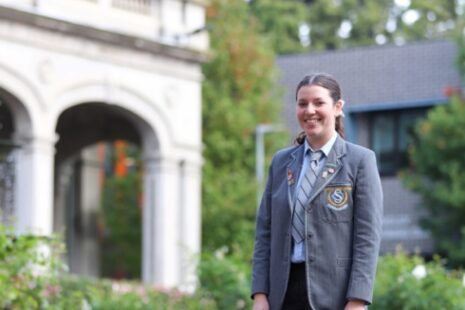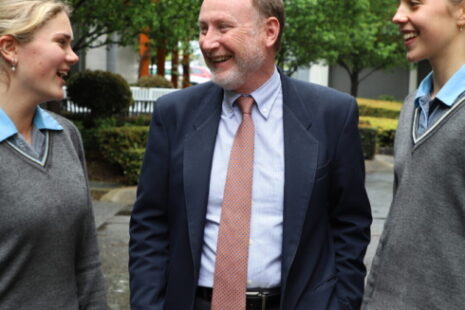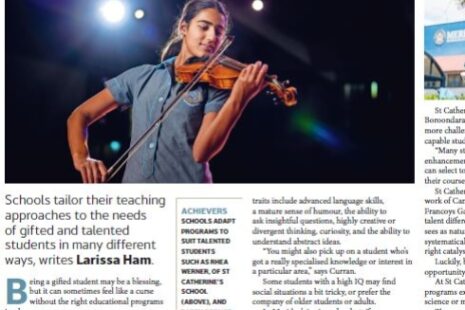The Importance of Visual Arts in Schools

For St Catherine’s School student, Amanda Shen, her ability to balance Year 12 Mathematical Methods and English with an accelerated university subject at Deakin University is achieved through her involvement in Visual Arts. Amanda shares her thoughts on the importance of Visual Arts subjects in schools.
What subjects are you studying at St Catherine’s in Year 12?
Currently I am studying English, Mathematical Methods, Art Creative Practice, Health and Human Development as well as Real Estate and Property Management at Deakin University as an accelerated subject.
What made you select Visual Arts subjects alongside a Mathematics subject?
Initially at the beginning of Year 11, I was doing two Mathematics subjects – Methods and Specialist. Between these subjects and my content-heavy subjects I decided I needed another subject that would help me balance that.
Art for me became a form of escape and inspiration for my other subjects. It allowed me to take a break from content I was finding difficult and instead of leaving the concentrated mindset, it allowed me to channel my attention into a completely different form of thinking whilst still gaining valuable productivity.
I knew that over time to prevent myself from burning out I needed variety in my routine and Art was able to be that separator for me. I also wanted to expand my pathways beyond School and completing a folio subject would allow me to enter disciplines in areas such as Architecture which I have always held a particular interest in.
How do you feel your Visual Arts studies have assisted you in your other subjects?
Studying Art has allowed me to view and approach my other subjects quite differently.
With the lens we are required to analyse art through, I have learnt to see things from multiple perspective and look beyond the most obvious answer, finding the root or the ‘path less travelled.’
During my Legal Studies subjects this allowed me to see cases and questions through an additional cultural perspective, which I have learnt has a heavy impact on experiences and actions of people. Similarly in English, presenting an argument in analysis with my critical thinking skills allows me to perceive perspectives others may not, giving me a unique angle to present my ideas.
What do you believe the benefits of studying Visual Arts are?
I think Art channels a sense of creativity that is otherwise lost amongst the stress and pressure that comes with upper secondary studies. I know I have been pushed to think in directions I otherwise would not have been exposed to, especially in areas of problem solving and decision making.
Art also fosters a sense of commitment and pride in a long-term project which is extremely rewarding. Every day in Art I can see my progress and it brings me more confidence not only in that subject but also my other subjects also.
Something else I have noticed from studying Visual Arts is its ability to ‘distract’ from other subjects that focus on the textbook and material. As a folio subject, Visual Arts allows me to focus on how I feel and lets me become in tune with myself and my ideas. In this way it feels more self-directed and fulfilling.
What do you hope to do after graduating Year 12?
After Year 12 I hope to study a mixture of Law, Commerce, Real Estate and Architecture. This decision has been heavily influenced by the VCE subjects I have heavily enjoyed, merging all my studies hopefully into a broader discipline. I am looking at completing a ‘Land Economy’ course at the University of Cambridge or staying in Melbourne to study Commerce and the JD at Melbourne University.
In what ways has Visual Arts enhanced your critical thinking skills?
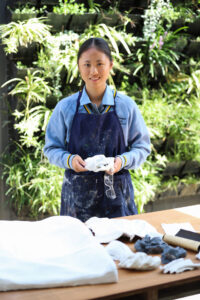 Speaking from personal experience, the art making process does not always go smoothly in which case we are coerced into finding solutions and alternative methods. We can find inspiration through independent research or seek advice from professionals which we have great access to at St Catherine’s.
Speaking from personal experience, the art making process does not always go smoothly in which case we are coerced into finding solutions and alternative methods. We can find inspiration through independent research or seek advice from professionals which we have great access to at St Catherine’s.
Since art is such an expressive form, we can often only take ideas from others instead of replicating techniques which fosters decision making skills and hence creativity in finding the best solution.
In the art making process the process of evaluation and judgment is also crucial, teaching me to assess the quality of my work and identify the areas in need of improvements.
In my Unit 3 artwork I experienced many unfamiliar encounters whilst working with a foreign material being plaster. Through this experience I was able to expound my critical thinking skills as I researched elaborately and used those findings to refine my materials and techniques.
Do you believe Visual Arts encourages a different type of thinking?
Yes, deeply. As Art is such an expressive term, each individual adapts and uses materials and techniques differently to create their own meaning and ideas. This promotes a sense of flexibility and openness in thinking, teaching us to appreciate our deeper perspectives.
This means there is not a uniform guide in achieving something worthy, inspiring individuals to think about their own purpose and meaning, encouraging us to think critically and reflect.
Visual Art asks us as artists to reach into our memories of experiences and see situations in a more emotional way, aiming to learn from them rather than analysing and condemning the past.
Creative thinking asks us to generate new and original ideas, concepts, and connections, searching for the bigger picture rather than breaking complex problems into smaller parts.
The passion to create art and produce purposeful pieces requires a kind of emotional ponder that needs a specific environment with a gentle force to succeed. This is what Visual Art fosters for us. It breeds deeper levels of thinking that covers wider breadths than other subjects making us more independent and deeper thinkers as individuals.
This is extremely beneficial as we move onto tertiary studies.
What do you believe are the benefits of receiving a St Catherine’s education?
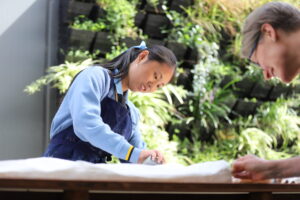 An education at St Catherine’s promotes individuality and personal creativity, focusing more on the process rather than the end achievements, letting that come naturally. I have felt this in both the Art Faculty and in the academic departments. We are assisted during the process of learning with teachers who tailor their teaching styles to individual needs.
An education at St Catherine’s promotes individuality and personal creativity, focusing more on the process rather than the end achievements, letting that come naturally. I have felt this in both the Art Faculty and in the academic departments. We are assisted during the process of learning with teachers who tailor their teaching styles to individual needs.
I have personally benefited from a St Catherine’s education through my teachers’ willingness to help and their drive to help me find my best way to learn. As someone who at times needs more reminders, I felt that St Catherine’s, as a smaller cohort, has enabled me to become more independent and take pride in my work, allowing me to find enjoyment in my classes instead of becoming unmotivated.
Our access to resources is also unmatched especially in the Art Department where we are provided assistance in any areas we would like to explore and trial.


